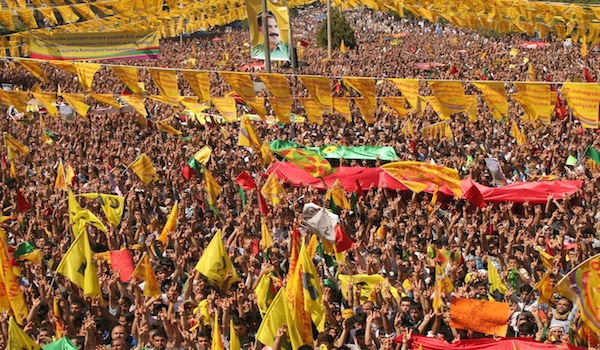 DIYARBAKIR, North Kurdistan, — Hundred thousands of Kurds joined Saturday election rally by Labour, Democracy and Freedom Block in Diyarbakir. The crowd enthusiastically said “Yes” to Amed Democratic City Council’s decision to implement the Democratic Self-rule, ANF reported.
DIYARBAKIR, North Kurdistan, — Hundred thousands of Kurds joined Saturday election rally by Labour, Democracy and Freedom Block in Diyarbakir. The crowd enthusiastically said “Yes” to Amed Democratic City Council’s decision to implement the Democratic Self-rule, ANF reported.
Gathering at Station Square in Diyarbakir for the rally of Labour, Democracy and Freedom Block, over 100 thousand people expressed their reactions to the ruling AKP with banners, slogans and placards. The rally, joined by BDP Co-Chairs Filiz Koçali and Hamit Geylani and Diyarbakir Candidates of the Block, began with one minute’s silence in memory of all those who lost their lives within the struggle for democracy.
DEMOCRATIC SELF-RULE ENTHUSIASM
While Medeni Alpkaya, on behalf of Amed Democratic City Council, read the council’s decision for “the realization of democratic self-rule”, the decision was put to vote of people. While 100 thousand people answered “Yes” to the historical decision, the start of a new process was given with a historical development. Enthusiasm grew in the area and flags and posters of Ocalan, KCK and PKK were raised following the approval of the council’s decision.
Among those who participated to the rally were BDP Co-Chairs Filiz Koçali and Hamit Geylani, the Block’s Diyarbakır candidates Leyla Zana, Nursel Aydoğan, Emine Ayna, Altan Tan, Şerafettin Elçi, detained Hatip Dicle’s Assignee BDP Provincial Chair M. Ali Aydın, Metropolitan Mayor Osman Baydemir and low level mayors, Vedat Yıldırım, Murat Çelikkan, Hakan Tahmaz, Osman Kavala, Orhan Dink, Fekenaz Uca, Hüseyin Ayman and HAKPAR (Rights and Freedoms Party) General President Bayram Bozyel (B.O)
The democratic self-rule principle requires that local governments be granted autonomy from the centralized system in its affairs regarding education, security and external relations. Significant pilot implementations have been running for months now, in several areas. In neighbourhoods, villages and hamlets where they live, Kurds have been setting up their own assemblies by getting organized. Through a 50-village commune in Diyarbakir, 21 local councils, four district councils and the city council, social, political, economic and cultural autonomy demands are being actualized.
“Village communes” have been set up in Diyarbakir for the first time. A commune consisting of 50 villages in the Bağlar district in Diyarbakir is being founded while works continue in other villages in other districts. In villages as part of communes, councils consisting of 11 or 13 members, depending on the village population, are being set up. Every village has spokespersons, one of whom is woman. Such a model is identical with the BDP’s co-chairmanship model.
In Diyarbakir, nine councils have been set up in the Bağlar district, five in Kayapınar, and four in Sur in addition to three neighbourhood councils, which are the smallest administrative unit. Neighbourhood councils aim to bring neighbours together, discuss common issues and find solutions, consisting of an average of 20-30 members. Each has two spokespersons, one of whom is woman. Even a disciplinary council exists within a neighbourhood council.
Problems, fights and discussions taking place in a neighbourhood are directly resolved in the “Neighbourhood Justice Commission” rather than official units. For instance, against drugs, prostitution, robbery, or usurps a neighbourhood council directly interferes as a dimension of the democratic autonomy model. If warning is not enough, individuals committing the said crimes are exposed in public and are removed from the region.
The city council is the largest body in the region. This has not been formed yet. The goal is to have 450 members in the prospective council. The executive council convenes weekly while the general council meets monthly. The city council covers all and organizes a convention every other year.
The BDP currently is in control of one greater municipality in Diyarbakir, in addition to seven provincial mayoralties and mayoralties in 51 towns and 40 smaller districts.